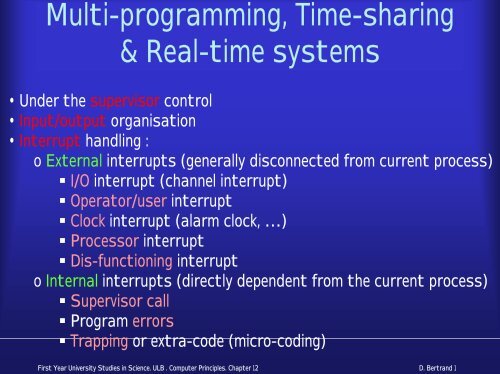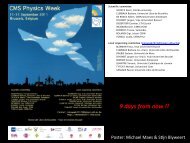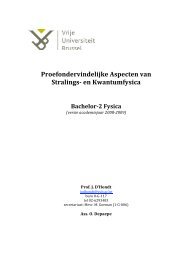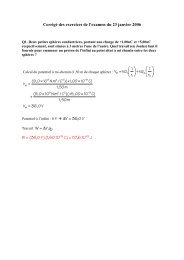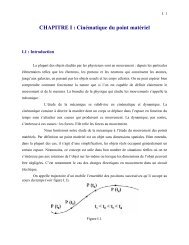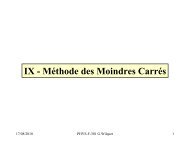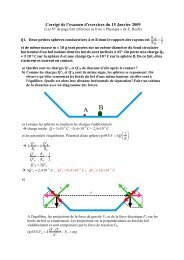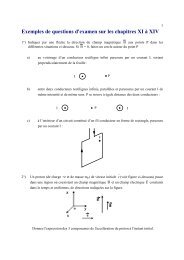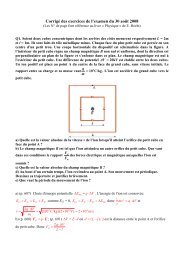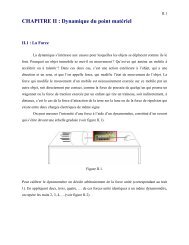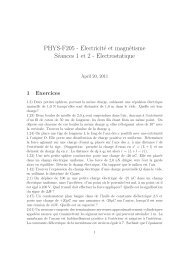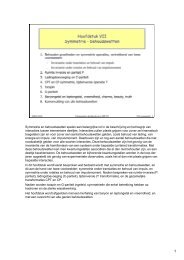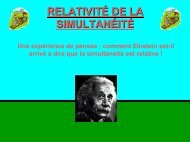Multi-programming, Time-sharing & Real-time systems - IIHE
Multi-programming, Time-sharing & Real-time systems - IIHE
Multi-programming, Time-sharing & Real-time systems - IIHE
You also want an ePaper? Increase the reach of your titles
YUMPU automatically turns print PDFs into web optimized ePapers that Google loves.
<strong>Multi</strong>-<strong>programming</strong>, <strong>Time</strong>-<strong>sharing</strong><br />
& <strong>Real</strong>-<strong>time</strong> <strong>systems</strong><br />
• Under the supervisor control<br />
• Input/output organisation<br />
• Interrupt handling :<br />
o External interrupts (generally disconnected from current process)<br />
• I/O interrupt (channel interrupt)<br />
• Operator/user interrupt<br />
• Clock interrupt (alarm clock, …)<br />
• Processor interrupt<br />
• Dis-functioning interrupt<br />
o Internal interrupts (directly dependent from the current process)<br />
• Supervisor call<br />
• Program errors<br />
• Trapping or extra-code (micro-coding)<br />
First Year University Studies in Science. ULB . Computer Principles. Chapter 12<br />
D. Bertrand 1
A simple mechanism<br />
• The interrupt handling task is chosen by the supervisor<br />
• No interrupt during the current interrupt handling<br />
• Interrupts can be masked (to avoid uncontrolled sequence breaking)<br />
User process<br />
Masked<br />
event<br />
Unmasked<br />
event<br />
interrupt<br />
Supervisor<br />
Interrupt<br />
analysis<br />
Interrupt<br />
end<br />
Process<br />
calling<br />
end of<br />
handling<br />
Interrupt routines<br />
1 st type<br />
interruption<br />
2 nd type<br />
interruption<br />
Interrupts<br />
enabled<br />
First Year University Studies in Science. ULB . Computer Principles. Chapter 12<br />
Interrupts<br />
disabled<br />
3 rd type<br />
interruption<br />
D. Bertrand 2
Implementation<br />
Registers :<br />
• General interrupt mask (MM = 1 : enabled; MM = 0 disabled) MM<br />
• Interrupt requests : array of bits IR<br />
• Interrupt masks : array of bits MS<br />
• Supervisor entry point for interrupt handling ES: 32 bits<br />
• PC saving memory zone<br />
PS: 32 bits<br />
Interrupts<br />
enabled ?<br />
MM=1 ?<br />
Interrupts<br />
masked ?<br />
yes<br />
n<br />
∑IRi.MS<br />
i<br />
≠ 0?<br />
i=1<br />
yes<br />
1 0 1 0 0 0 0 0 0 1 1 1 0 1 0 0<br />
0 0 0 0 0 0 0 0 0 1 1 1 1 1 1 1<br />
MM 0; PS PC<br />
PC ES<br />
1<br />
no<br />
I [PC]<br />
Execute I<br />
no<br />
• ES register can be replaced by an array<br />
• Each entry pointer to a specific service routine<br />
• Working registers saving (stack) !<br />
First Year University Studies in Science. ULB . Computer Principles. Chapter 12<br />
D. Bertrand 3
<strong>Multi</strong><strong>programming</strong><br />
Variation in speed of various modules of a computer dead <strong>time</strong>s<br />
Task A<br />
input<br />
channel 1<br />
Processing<br />
output<br />
channel 2<br />
Task B<br />
Task B : timing ≡ timing task A; independent I/O channels<br />
input<br />
channel 3<br />
1<br />
Processing 1<br />
output<br />
channel 4 1<br />
1<br />
1 2 3 4 5 6 7 8 9 10<br />
First Year University Studies in Science. ULB . Computer Principles. Chapter 12<br />
2<br />
3<br />
1 2<br />
3<br />
4<br />
5<br />
2<br />
1<br />
2<br />
2<br />
ideal configuration !!!<br />
3<br />
2<br />
3<br />
4<br />
3<br />
4<br />
3<br />
4<br />
5<br />
4<br />
5<br />
D. Bertrand 4<br />
4<br />
5<br />
<strong>time</strong>
Processes states<br />
• Concurrent processing : 3 states recognised by the scheduler<br />
• Working state : task using the control unit (computational state)<br />
• Waiting state : task waiting for an external resource<br />
• Ready state : task waiting for the control unit (main resource)<br />
• Scheduler serving the first ”ready” task<br />
• Priority system can be implemented<br />
system idle<br />
Task A<br />
waiting<br />
ready waiting ready ready<br />
Task B<br />
waiting<br />
ready<br />
waiting<br />
ready<br />
waiting ready<br />
Task C<br />
ready<br />
waiting<br />
ready<br />
waiting<br />
1 2 3 4 5 6 7 8 9 10<br />
<strong>time</strong><br />
First Year University Studies in Science. ULB . Computer Principles. Chapter 12<br />
D. Bertrand 5
Interrupt use<br />
• Task entering waiting state control given to supervisor :<br />
o Special interrupt : Supervisor call<br />
o System records the transition state (working waiting)<br />
o System records the restart condition (resource availability)<br />
o System chooses a task ready to work (priorities !)<br />
o Interrupt handling<br />
o State transition handling (scheduling work : next task to run)<br />
Task A<br />
switching <strong>time</strong> = supervision cost As small as possible !<br />
from task A<br />
1 2 3 4 5 6 7 8 9 10<br />
<strong>time</strong><br />
First Year University Studies in Science. ULB . Computer Principles. Chapter 12<br />
waiting<br />
Task B ready<br />
Task C ready ready<br />
Chan. 1 ready<br />
interrupt<br />
from chan. 1<br />
ready<br />
ready<br />
waiting<br />
D. Bertrand 6
Job classes and priorities<br />
Two main categories of processes :<br />
• CP-bound : computation in central memory; few I/O (number crunching)<br />
• IO-bound : little computation; many I/O operations<br />
• If only CP-bound processes : processor idle <strong>time</strong> very small<br />
no gain (even losses !) with multi-<strong>programming</strong><br />
• If only IO-bound processes : efficiency depends on synchronisation<br />
Mixture of CP-bound and I/O bound processes<br />
Task A I/O<br />
Task A<br />
Task B<br />
ready<br />
ready<br />
waiting<br />
ready<br />
ready<br />
waiting<br />
ready<br />
ready<br />
well-balanced<br />
system<br />
(use of clock inter.)<br />
Task A I/O<br />
Task A<br />
Task B<br />
ready<br />
ready<br />
waiting<br />
ready<br />
ready<br />
1 2 3 4 5 6 7<br />
First Year University Studies in Science. ULB . Computer Principles. Chapter 12<br />
Unbalanced<br />
system<br />
(optimised for proc.<br />
not for periph.)<br />
<strong>time</strong><br />
D. Bertrand 7
Spooling<br />
• Sharing of ”sequential” peripherals (printers, magnetic tapes) difficult<br />
• Not a problem for random access devices (different areas)<br />
To solve the problem :<br />
Deferral output system<br />
• Output sent to a secondary storage device (magnetic disk, …)<br />
• At the end of the task output put into an output queue<br />
• When the device is ready : get one of the files of the output queue<br />
(special task : the output symbiont)<br />
Remarks<br />
• Symbiont : part of system software but handled as a user process<br />
• Queues can be built for different classes of peripherals (staging …)<br />
• A class of devices can be handled by the same or different symbionts<br />
• Same system can be applied to input queues<br />
• Priorities can be defined at the level of the queues<br />
First Year University Studies in Science. ULB . Computer Principles. Chapter 12<br />
I/O device spooling<br />
D. Bertrand 8
Input<br />
device<br />
Input<br />
queue<br />
Input<br />
symbiont<br />
Job<br />
scheduler<br />
working<br />
Request<br />
Job evolution<br />
Process<br />
Process<br />
scheduler<br />
waiting<br />
Resources<br />
scheduler<br />
ready<br />
Output<br />
scheduler<br />
Output<br />
symbiont<br />
Termination<br />
Output<br />
device<br />
Output<br />
queue<br />
The operating system manages this evolution :<br />
tables (status of the system and of its components)<br />
o queue content<br />
o processes status<br />
o memory/peripherals occupation<br />
choices algorithms (scheduling)<br />
resource management (allocation)<br />
First Year University Studies in Science. ULB . Computer Principles. Chapter 12<br />
D. Bertrand 9
<strong>Time</strong> <strong>sharing</strong><br />
<strong>Multi</strong>-programmation resource usage optimisation<br />
But …<br />
Response <strong>time</strong> ?<br />
Response <strong>time</strong> = reading <strong>time</strong> + waiting <strong>time</strong> in input queue<br />
+ execution <strong>time</strong><br />
+ waiting <strong>time</strong> in output queue + output <strong>time</strong><br />
execution <strong>time</strong> = Σ working <strong>time</strong>s + Σ waiting <strong>time</strong>s + Σ ready <strong>time</strong>s<br />
Reduction of processor idle <strong>time</strong> may be inefficient for response <strong>time</strong> !<br />
Example :<br />
• Two CP-bound tasks<br />
• Different execution <strong>time</strong>s (60 minutes ↔ 1 minute)<br />
• Tasks are submitted at different <strong>time</strong>s<br />
First Year University Studies in Science. ULB . Computer Principles. Chapter 12<br />
D. Bertrand 10
1 st case :<br />
Task A<br />
Task B<br />
ready<br />
0 11<br />
• Looks like mono-programmation !<br />
60 61 <strong>time</strong><br />
• But control unit is quite efficiently used<br />
• User A happy !<br />
• User B must wait 50 minutes for the execution of one minute job !<br />
2 nd case :<br />
Task A<br />
Task B<br />
0 11 12 61<br />
<strong>time</strong><br />
• Less efficient (more switching <strong>time</strong>)<br />
• User B happy (response <strong>time</strong> reduced by 50)<br />
• User A still happy (response <strong>time</strong> increased by 1.5 %)<br />
• Average response <strong>time</strong> : 31 minutes (55 minutes in the first case)<br />
First Year University Studies in Science. ULB . Computer Principles. Chapter 12<br />
D. Bertrand 11
Remarks<br />
• Many short processes delay for medium and long processes<br />
• Execution <strong>time</strong> is not always a priori known (errors, convergences, …)<br />
Other technique :<br />
• Put a working process in waiting state after a given <strong>time</strong> slice<br />
• Activate a ready process<br />
• Continue with another process …<br />
clock interrupt<br />
Task A<br />
Task B<br />
Task C<br />
ready<br />
ready<br />
<strong>Time</strong>-<strong>sharing</strong> :<br />
ready<br />
1 2 3 4 5 6 7 8 9 10<br />
<strong>time</strong><br />
• All processes systematically put to working state (quasi-parallelism)<br />
• Short processes quickly finished<br />
• Medium and long processes not indefinitely waiting<br />
First Year University Studies in Science. ULB . Computer Principles. Chapter 12<br />
ready<br />
ready<br />
ready<br />
D. Bertrand 12
<strong>Multi</strong>-programmation<br />
<strong>Time</strong>-<strong>sharing</strong><br />
Comparison<br />
Simultaneous management<br />
of several processes<br />
<strong>Multi</strong>-management <strong>systems</strong><br />
Main aim Method Consequence<br />
<strong>Multi</strong>-programmation<br />
optimisation of<br />
control unit usage<br />
Management of<br />
several processes<br />
quasi-parallelism<br />
<strong>Time</strong>-<strong>sharing</strong><br />
Response <strong>time</strong><br />
optimisation (users)<br />
Management of<br />
several processes<br />
better use of<br />
active resources<br />
Some operating <strong>systems</strong> based on a compromise<br />
First Year University Studies in Science. ULB . Computer Principles. Chapter 12<br />
D. Bertrand 13
Interactive <strong>systems</strong><br />
• Task directives given interactively by the user<br />
• Each user has its own access units (terminal : keyboard + screen)<br />
• The user units do not need to be driven by a symbiont<br />
• Commands generate interrupts and tasks state transition<br />
Average response <strong>time</strong> = n . t<br />
n : number of users; t : average execution <strong>time</strong> of a command<br />
• In general system in waiting state<br />
• Each user get the impression to have his own computer<br />
First Year University Studies in Science. ULB . Computer Principles. Chapter 12<br />
D. Bertrand 14
<strong>Real</strong> <strong>time</strong> <strong>systems</strong><br />
<strong>Time</strong>-<strong>sharing</strong> <strong>systems</strong> with strict timing constraints<br />
Systems requiring minimum response <strong>time</strong> :<br />
• Process control in industry<br />
• Probe control in space<br />
• Electronic assistance <strong>systems</strong> in cars<br />
• Flying <strong>systems</strong> in planes<br />
• Data acquisition <strong>systems</strong> (physics, chemistry, …)<br />
Systems requiring fast but not critical response <strong>time</strong> :<br />
• Reservation <strong>systems</strong> (plane, trains, …)<br />
• Automatic banking <strong>systems</strong>, …<br />
First Year University Studies in Science. ULB . Computer Principles. Chapter 12<br />
D. Bertrand 15


